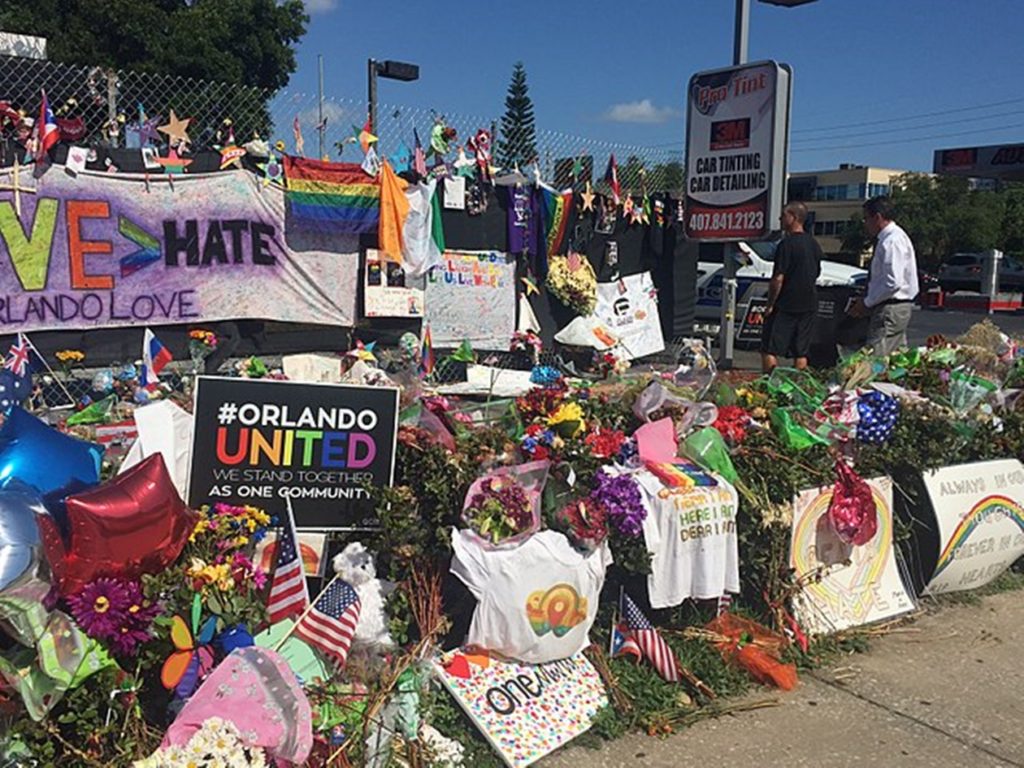
A bill that would designate Orlando, FL's Pulse nightclub, the site a 2016 mass shooting that left 49 people dead and the LGBTQ community in shock and sadness, as a national memorial won approval in the U.S. House of Representatives Wednesday.
“Orlando Strong is more than just a slogan, it is a promise to support each other and to never forget those we lost and those who were injured on that tragic night. By establishing Pulse as a national memorial, we will honor their memories and remind ourselves of that promise,” said Rep. Val Demings.
Demings co-sponsored HR 49 alongside fellow Florida Representatives Darren Soto and Stephanie Murphy. Flanked by photos of the 49 victims, Demings continued, “My bishop once called the Pulse nightclub a place for late night fellowship, a place for fun, laughter, family, and friendship. These are such fundamental things. We know this now more than ever after the pandemic. We see just how precious these things truly are.”
“This horrific act of hate and terror against our LGBTQ and Latino community and African community and Anglo community could have divided us, but we came together stronger than ever before. Orlando swore as a community to never forget those we lost that night,” Soto said. He believes that making the nightclub that still draws LGBTQ people wishing to pay their respects “would honor the 49 lives taken on June 12, 2016 as well as the survivors, the first responders who so heroically came to the rescue of so many others and the entire central Florida community.”
Though the shooting was later revealed not to be motivated by anti-LGBTQ sentiment, the Pulse shooting has remained a significant event that continues to rally, inspire and motivate continued LGBTQ advocacy.
The bill, HR 49, would make Pulse nightclub a “non-affiliated” national memorial, meaning it wouldn't be owned and operated by the National Park Service and wouldn't require federal funds. Instead, the memorial would be operated independently by the onePULSE Foundation, a nonprofit led by Pulse owner Barbara Poma whose goal is to establish a National Pulse Memorial & Museum.
While memorializing the 49 victims and 53 wounded during the shooting is widely supported, the onePULSE Foundation has been rife with criticism from survivors and families of victims, with much of the focus placed on Poma herself. Poma's decision to not sell the property housing the nightclub to the city of Orlando and spearhead the establishment of a memorial and museum through her own nonprofit drew accusations that Poma was monetizing the tragedy. A 2019 audit of onePULSE's finances revealed that Poma's yearly salary as CEO of onePULSE amounted to $150,000.
The proposed design of the museum, a towering spiral structure that resembles a nuclear reactor, has also met with detractors saying its design is too grandiose.

Some of those opposing Poma's plan formed the Community Coalition Against a Pulse Museum (CCAPM) to advocate against onePULSE. CCAPM proposes that “a public memorial park that does not seek to capitalize on the mass shooting in any way” be built to honor the 49 lives lost and that the money onePULSE raises “go to the continued care of survivors.”
A collection of survivors and victim's family members sued Poma and her husband, Rosario Poma, alleging that insufficient security, illegal construction and code violations impeded patrons from fleeing the club during the shooting.
The introduction of HR 49 on Wednesday isn't the first time the federal government has tried to memorialize one of the worst acts of terror against the LGBTQ community in the nation's history. A similar bill passed a House vote last year but gained no traction in the Senate after neither Senator from Florida offered support. That doesn't appear to be the case this time around, though. According to Florida Politics, Sen. Rick Scott, who was Governor of Florida when the Pulse shooting occurred, plans to introduce similar legislation to the Senate as soon as this week.
Barring any hangups in the Senate, the final approval of the Pulse nightclub memorialization effort could line up with the fifth anniversary of the shooting on June 12.
“We owe it to those we lost, to honor their memories by dedicating a national memorial at Pulse. A memorial that reflects the same love, acceptance, and spirit of community that embodied the victims and that embodies the LGBTQ community at large,” Murphy said. “By taking this important step America is telling the world that we will never let hate win, that we won't forget the victims, and that we will fight to ensure no community will ever go through something like this again.”
Photo courtesy of Dannel Malloy/Creative Commons



